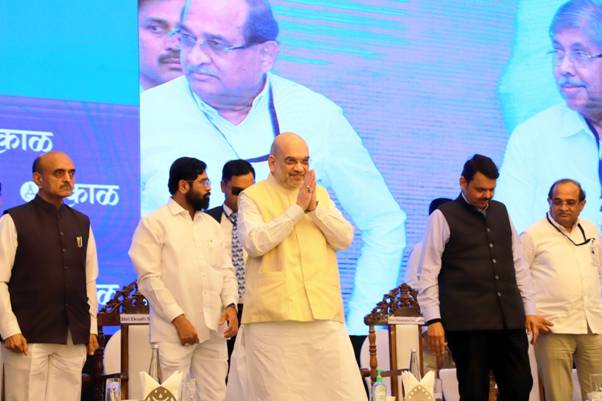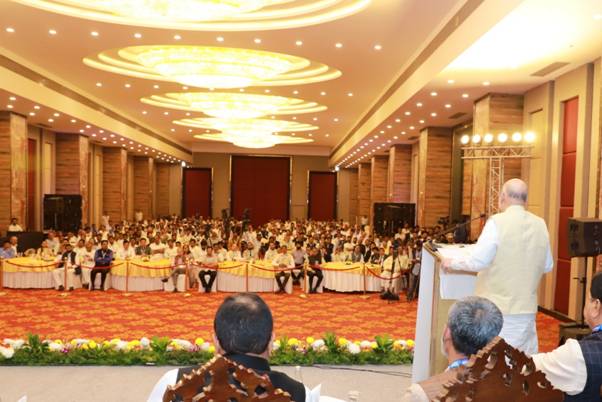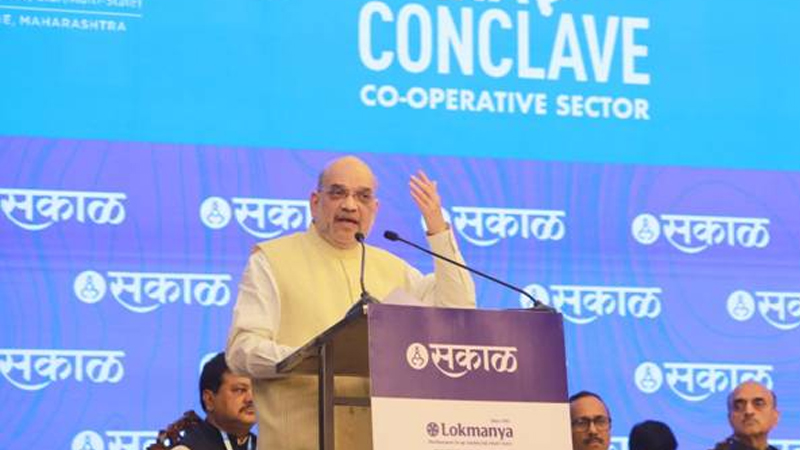Union Home Minister and Minister of Cooperation, Shri Amit Shah attended the two-day Sahakar Sammelan organized by Dainik Sakal Group as the chief guest at Pune, Maharashtra today. Several dignitaries including Chief Minister of Maharashtra, Shri Eknath Shinde and Deputy Chief Minister Shri Devendra Fadnavis were present on this occasion.

In his address, the Union Cooperation Minister said that the Government under the leadership of Prime Minister Shri Narendra Modi will make every possible effort to solve the problems of the cooperative sector. He said that today, Maharashtra is among the few states in the country which are doing well in the cooperative sector. He said that co-operatives in Maharashtra are very old as cooperative has been the nature of Maharashtra and this state has contributed a lot in spreading co-operatives across the country.
Shri Amit Shah said that Prime Minister Shri Narendra Modi has established a separate Ministry of Cooperation so that all cooperative issues can be focused upon. He said that even today, 31 percent of India’s total sugar production is done by cooperative sugar mills, 16 percent of milk is procured from cooperative institutions, 13 percent of wheat, 20 percent of paddy is procured by coopertives and 25 percent of total fertilizers are produced by cooperative societies. He said that if the rural economy does not get a big thrust from cooperatives then it cannot flourish. Shri Shah said that there is a huge network of Cooperative Credit Societies in our country and this has given impetus to the economic development of the lower strata of the country. He said that even today co-operative is not irrelevant and after upcoming decade co-operative will be the most relevant sector.
The Union Home Minister and Minister of Cooperation said that the cooperative sector of Maharashtra is big, strong and comprehensive. Out of about 8.5 lakh cooperative societies in the country, 2 lakh are in Maharashtra. 67 percent of the country’s residential cooperative societies are in Maharashtra, 35 percent of livestock societies, 27 percent of sugar cooperative societies, 16 percent of marketing societies, 14 percent of fishery industry societies and 11 percent of food processing societies are in Maharashtra. In addition, Maharashtra has 21 percent of the country’s PACS, and 32 percent of the total urban banks which means 490 banks are in Maharashtra, along with 6529 bank branches are here which is 60 percent of the country’s total branches. This means that cooperatives are major strength of Maharashtra. Maharashtra has deposits of about Rs 3.25 lakh crore through Urban Cooperative Banks, which is 62 percent of the total urban bank deposits in the country.

Shri Amit Shah said that Prime Minister Shri Narendra Modi had constituted the Ministry of Cooperation with a big vision to increase the prosperity of rural, semi-urban and urban areas of the country through cooperatives. He said that the entire country has been mapped from the point of view of cooperatives – as developed states, developing states and underdeveloped states, and through this we tried to find solutions to the problems of each region. He said that once upon a time mass production was the formula for development, but in a country like India with a huge population, there is a need to remove unemployment and empower people economically through the formula of mass production by masses.
The Union Cooperation Minister said that unless the basic primary societies are strengthened in the country, co-operatives cannot be strong. He said that the Government led by Prime Minister Shri Narendra Modi has decided to computerize the country’s 63,000 PACS to strengthen them. Along with this, new model bylaws of PACS have been prepared and sent to the states, in which provision has been made to make PACS multi-purpose. The government under the leadership of Prime Minister Shri Narendra Modi is making efforts to make PACS viable through 30 different works under the model bylaws of Multidimensional PACS. He said that under the leadership of Prime Minister Shri Narendra Modi, it has been decided to make Multidimensional PACS in every Panchayat and now 2 lakh new PACS will be made in India in 3 years, after which PACS will be available in every Panchayat of the country.

Shri Amit Shah said that PACS are also being given the task of CSC (Common Service Center) and for this a National Cooperative Database is being created and 80 percent work has been completed. Through this we will be able to expand cooperatives and find dry areas. He said that to give a strong base to this entire process, a cooperative policy will have to be formulated and for this a committee has been formed which will prepare the draft cooperative policy in a short span of time. He said that the new cooperative policy will decide the direction of cooperatives in the country for the next 20 years. He said that along with promoting cooperatives, to meet the requirement of trained manpower in this sector, the government led by Prime Minister Shri Narendra Modi has decided to set up a multipurpose cooperative university, which will provide trained manpower for every sector of cooperatives. Shri Shah said that the size and scope of the National Cooperative Development Corporation (NCDC) will be increased by more than three times before 2025. The government under the leadership of Prime Minister Shri Narendra Modi has also permitted the cooperatives for Government procurement on the GEM portal. He said that the in this year’s budget, Government led by Prime Minister Shri Narendra Modi has brought parity in taxation matters for the cooperative societies. He said that the Government has also retrospectively waived the due amount of Rs.10 thousand crores additional income tax that cooperative sugar mills had to pay on payment of sugarcane which is an unprecedented step. Along with this, 3 multistate cooperative societies are also going to be formed on the lines of Amul. He said that a multistate cooperative organic society will be formed for marketing of organic products, which will not only perform the testing of land and product but will also do the branding of organic products. We are also going to set up a multistate export house which will export farmers’ produce through PACS and deposit its profits directly into farmers’ accounts from PACS. He said that the government led by Prime Minister Shri Narendra Modi has also given FPO status to PACS, so that now all the benefits given to FPOs will be available to PACS.
The Union Cooperation Minister said that the Government of India had decided in 2015 that by 2025, we will mix 20 percent ethanol in petrol. For this, a mid-term target was set till 2022 that 10 percent ethanol blending would be reached in November, 2022, but we achieved this target ahead of time in September itself, which has become 12 percent today. He said that this reduced our oil import by 10 percent and saved foreign exchange of about Rs 41,500 crore, which also reduced our trade deficit and this 10 percent went to the cooperative sugar mills and through them to the farmers. Apart from this, Rs 2 lakh crore will be invested for the construction of ethanol projects and the central government will pay 6% interest through subsidy. With 10% mixing of ethanol, a reduction of 27 lakh tonnes of carbon emissions has been achieved and with 20% mixing, these figures will be doubled.
Shri Amit Shah said that the cooperative sector will have to self introspect on its performance and increase its credibility. He said that the cooperative sector should improve its systems and take up its responsibilities. He said that now no one can do injustice to the cooperative sector and with the principle of Sehkar se Samridhi given by Prime Minister Shri Narendra Modi by forming the Ministry of Cooperation, no one can stop the growth of the cooperative sector.


